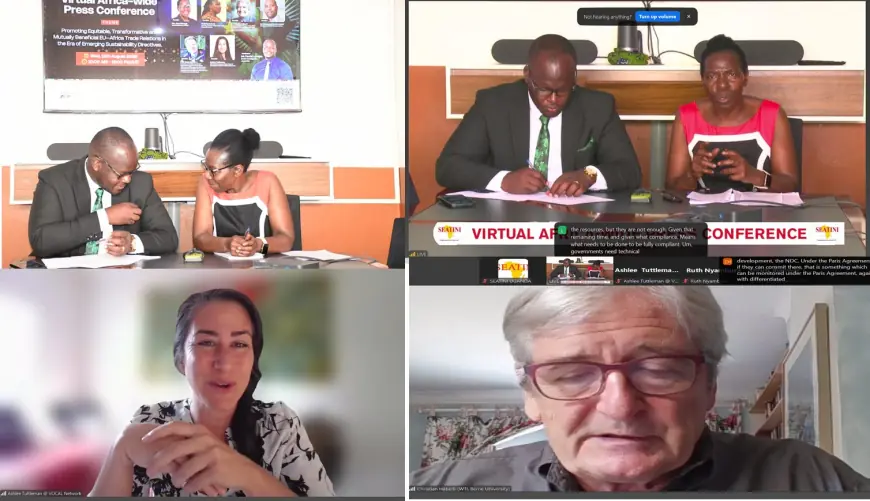African CSOs & Experts raise concerns against the EU-Africa trade policies.

Various African Civil Society Organizations (CSOs), Smallholder cocoa and coffee farmers’ networks, trade, agriculture, and development experts from Africa, the Global South, and the Global North, that are united by a shared vision for fair and sustainable trade, have expressed deep concerns over the widening disparities and structural imbalances that continue to characterize EU–Africa trade relations.
In a joint statement, signed by Southern and Eastern Africa Trade Information and Negotiations Institute (SEATINI), VOCAL (Voice of Organizations in Coffee Alliance) Network and Transform Trade, The African Biodiversity Network (ABN), the organizations have said that though they recognize that addressing the issue of climate change, biodiversity loss, and pollution is key, there is a need to have just, inclusive global partnerships without imposing unilateral policies on trade.
“We recognize the urgency of addressing the triple planetary crisis: climate change, biodiversity loss, and pollution, and support the global shift toward sustainable production and consumption, as outlined in SDG 12. However, we caution that this transition must be just, inclusive, and shaped through equitable global partnerships, not unilateral policy impositions.” Reads in part.
This was revealed during a virtual press conference held on 13th August 2025, themed: “Promoting equitable, transformative and mutually beneficial EU–Africa trade relations in the era of emerging sustainability directives.”
Among the disparities, they cited the EU Deforestation Regulation (EUDR), which they said mandates full traceability for key exports such as cocoa, coffee, rubber, and wood, where the compliance burdens often fall squarely on African producers, many of whom lack the digital infrastructure, financing, or institutional support to meet these requirements. Africa accordingly risks losing an estimated US$5.93 billion in cocoa exports, and billions more across other commodities, with rural farmers, women, youth, and MSMEs bearing the brunt.
“The environmental and trade frameworks of the EU and other global trade partners of Africa must not reinforce historical imbalances or replicate the extractive dynamics of past trade regimes. Instead, they must serve as instruments for a just transition promoting climate-resilient, people-centered cooperation in which Africa is recognized not as a mere supplier of raw materials, but as a co-architect of equitable global standards.” they say
They called upon African governments and private sector chain actors to shape trade and sustainability frameworks that serve all African people, including: asserting continental agency in shaping green trade rules, anchored in Africa’s Nationally Determined Contributions (NDCs), Agenda 2063, and the AfCFTA, strengthening intra-African coordination and harmonization of standards to avoid fragmentation and dependency on external rules, investing more in institutional preparedness including shared-cost-based traceability systems, farmer education, and regulatory infrastructure through national budgets, public-private partnerships, and strengthening the quality of continental institutions, upholding Afrocentric, inclusive development models that prioritize domestic value addition, regional value chains, and green industrialization, ensuring African CSOs and producer groups and other private value chain actor are meaningfully included in policymaking at all levels among other measures.
They urged the European Union and all other countries, development partners, and multinational corporations investing in Africa to: establish inclusive and participatory mechanisms involving African CSOs, farmer groups, other private chain actors and regional bodies in the design and implementation of EU sustainability directives, provide dedicated financing and technical assistance for compliance infrastructure, including traceability systems, digital tools, farmer education, and institutional readiness, adopt flexible, context-sensitive timelines and differentiated responsibilities for smallholder-dependent economies, consistent with CBDR principles, ensure equitable burden-sharing between all importers of African goods and services, African value chain actors, and multinational corporations to prevent cost transfers onto the most vulnerable actors among others.
Since launching the European Green Deal (EGD) in 2019, the EU has introduced more than 50 policy instruments, including the EU Deforestation Regulation (EUDR), Corporate Sustainability Due Diligence Directive (CSDDD), Corporate Sustainability Reporting Directive (CSRD), and Carbon Border Adjustment Mechanism (CBAM). While well-intentioned, these instruments have been developed without adequate consultation, transparency, or shared implementation across all African governments, CSOs, traders, processors, farmer networks or regional institutions.
What's Your Reaction?
 Like
0
Like
0
 Dislike
0
Dislike
0
 Love
0
Love
0
 Funny
0
Funny
0
 Angry
0
Angry
0
 Sad
0
Sad
0
 Wow
0
Wow
0
















































